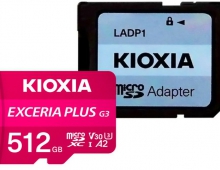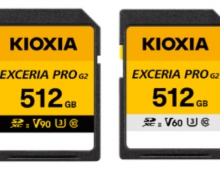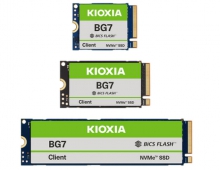
KIOXIA Debuts UFS Ver. 3.1 Embedded Flash Memory Devices, Expands KumoScale Software Suite
KIOXIA America, Inc. (formerly Toshiba Memory America, Inc.) has started sampling Universal Flash Storage (UFS) Ver. 3.1 embedded flash memory devices.
Suited for mobile applications requiring high-performance with low power consumption, the new lineup utilizes KIOXIA’s BiCS FLASH 3D flash memory and is supported in four capacities: 128 gigabytes (GB), 256GB, 512GB, and 1 terabyte (TB).
The new devices integrate BiCS FLASH 3D flash memory and a controller in a JEDEC-standard 11.5 x 13mm package. The controller performs error correction, wear leveling, logical-to-physical address translation, and bad-block management for simplified system development.
All four devices include the following features:
- WriteBooster: Enables faster write speeds (more than 2-3X the speed of Ver. 3.0)
- Sequential Read Performance: Improved by approximately 30% over existing Ver. 3.0.
- Host Performance Booster (HPB) Ver. 1.0 (defined as an extension specification): Improves random read performance by utilizing the host side memory.
- UFS-DeepSleep Power Mode: Achieves power consumption reduction in sleep mode compared to UFS-Sleep Power Mode.
- Performance Throttling Event Notification: UFS may throttle performance, if the internal temperature reaches its upper limit, to avoid overheating and damage to the internal device circuits.
KIOXIA also today announced that its KumoScale storage software based on NVM Express over Fabrics (NVMe-oF) now includes a distributed, resilient provisioner service.
KumoScale Provisioner Service joins the software suite’s intelligent control plane, which manages the entire fleet of KumoScale storage nodes. The service works by tracking the fleet of SSDs and KumoScale storage nodes and managing the dynamic mapping of user volumes to nodes and physical drives. The service facilitates the adaptation of the KumoScale API to work with any provisioning tool or orchestration framework used to manage cloud infrastructures.

Kubernetes has become the de facto standard framework for intelligently assigning containerized applications to compute resources. Similarly, the new KumoScale Provisioner Service handles the intelligent assignment of data volumes to storage resources. “What Kubernetes does for containers, KumoScale Provisioner Service does for storage volumes,” noted Joel Dedrick, vice president and general manager, networked storage software, KIOXIA America, Inc. “The provisioner service acts as the gateway to the entire fleet of KumoScale storage nodes. It removes the guesswork associated with storage allocation, and automatically provides the right amount of capacity and performance to each application workload, within the cloud data center.”
KumoScale Provisioner Service features include:
- Performs intelligent mapping of user-specified storage volumes to KumoScale nodes and physical drives
- Processes provisioning requests: Selects the best KumoScale node, chooses the SSD and how to map it, and creates the volume via REST API





















